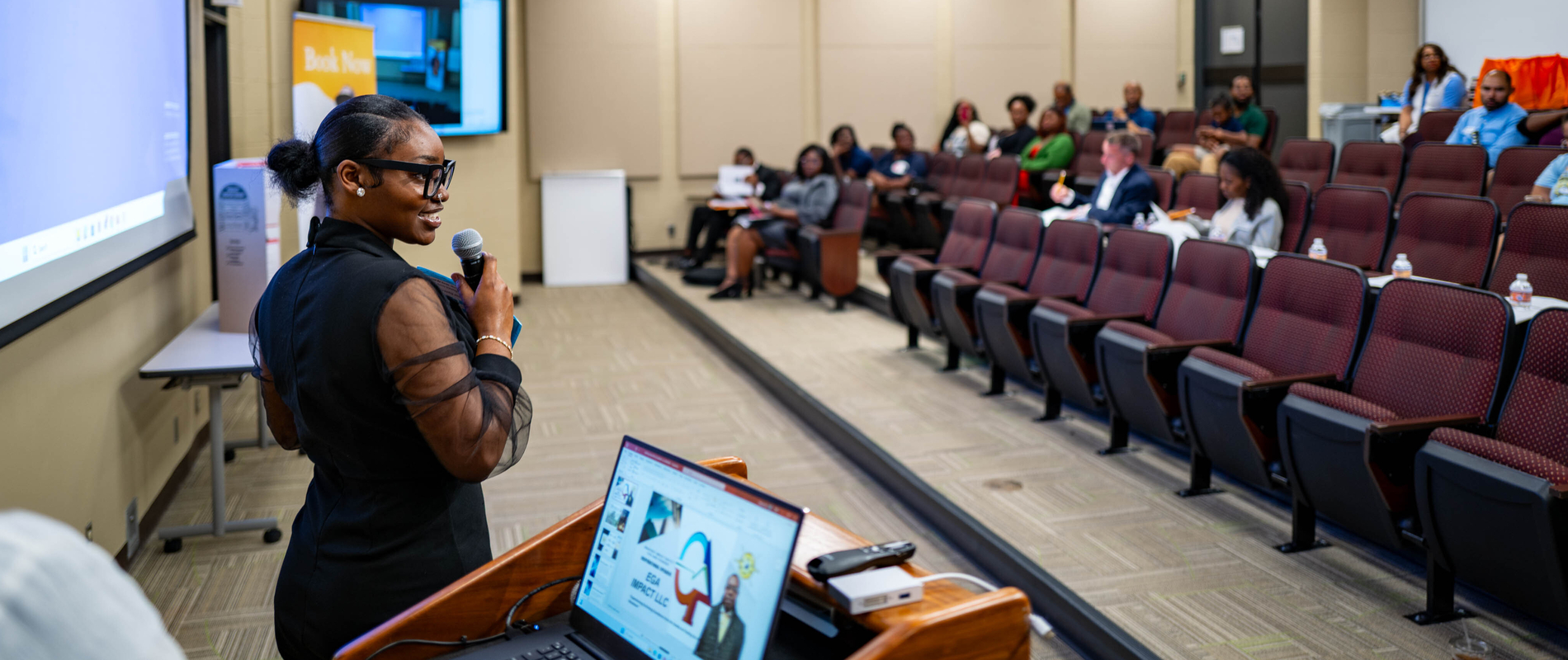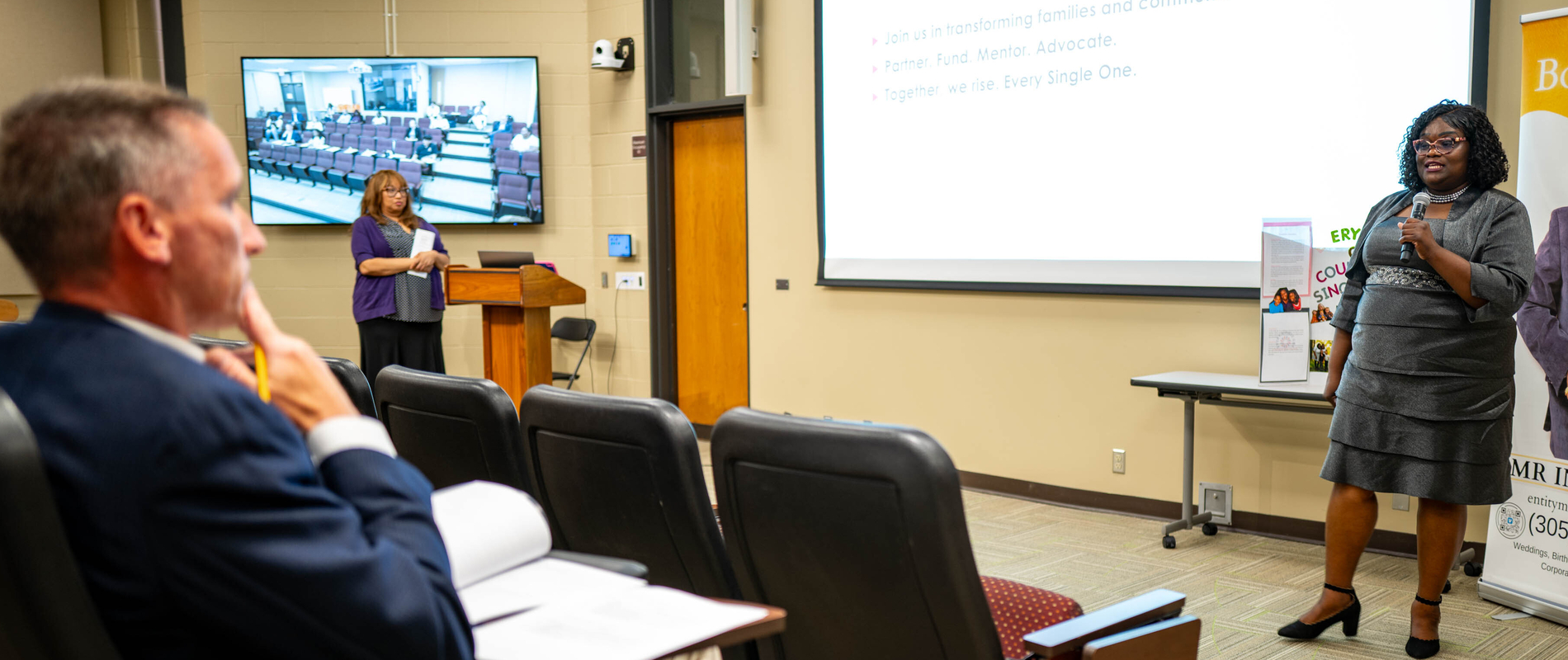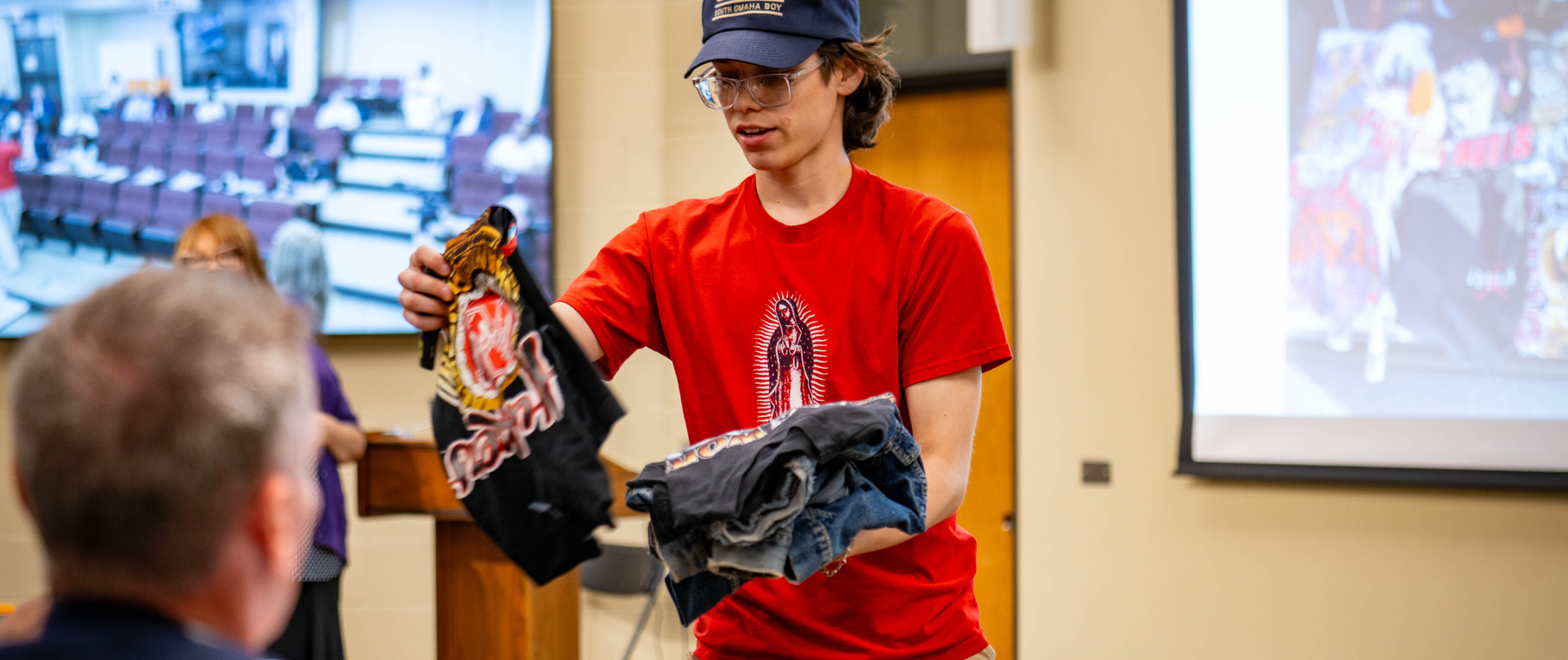Pitching passion: Student entrepreneurs present business concepts in inaugural MCC FastTrac competition


Savannah Behrends
Copywriter and features editor | August 28, 2025
Every business begins with an idea. Turning that idea into reality takes vision, planning and, above all, confidence — something MCC students gained in the FastTrac Entrepreneurship and Business Development program.
By the end of the 10-week program, five students weren’t just dreaming — they were pitching their business plans with confidence to a panel of investors, advisors and peers. Three earned seed funding to help bring their visions to life.
The program — offered for credit or noncredit — is hosted at the College’s new Business Development Center, located at MCC at The Ashton in the Millwork Commons district in north downtown. The location was intentionally chosen to foster synergy with startups and small businesses while providing additional resources to the area.
While optional, the pitch competition gave program participants a chance to test their business plans and receive feedback from other business owners, entrepreneurs and experts.
Taught by peers
Daphne Cook, MCC director of Business Development Education, said she was impressed by the diversity of pitch competition participants.
“We had a student who had just graduated from high school, a student who’s in his 50s, a student who already has a successful business and a student who has a master’s degree. It really reflected the diversity, not just of our students, but of businesses.”
The wide variety of program participants was a testament to the research done by MCC executive director of Business Development, Dr. Marla Ashe.
Ashe said focus groups indicated participants wanted to be taught by other small business owners they could relate to.
One of those instructors is Tiffany Johnson, a career advisor for the Walter Scott, Jr. Career Pathway Scholarship program and a small business owner. Johnson decided to pursue her associate degree in business administration at MCC in 2009.
“I was laid off because I didn't have a degree, so I came back to college to get that degree that no one can take away from me,” she said.
Since graduating, Johnson has held multiple roles at MCC, including tutor, Learning and Tutoring Center trainer and adjunct professor.
Melani Luedtke-Taylor, who in addition to owning her own consulting business teaches the Intro to Entrepreneurship class at MCC, was also brought on to share her expertise.
“I really understand some of the struggles that some of the students have,” Luedtke-Taylor said. “I went to school at night; that’s how I got both my bachelor’s and master’s. I also went to MCC to complete my first credits.”
Real-world application

With a doctorate in business administration, Ashe understood the limitations of traditional approaches to entrepreneurship and business development instruction.
“Business is conceptual, and many entrepreneurial curriculums are rooted in theory and lack practical applications,” Ashe said. “We needed something different.”
After learning about the Kauffman Foundation’s FastTrac curriculum, she knew she’d found the right fit. The program, which is offered in person and online, was not only applicable for entrepreneurs at any stage but also provided hands-on learning.
“We talk about the real-time application — transitioning from theory to the real world in stages,” Johnson said. “There’s the ideation stage, the business plan stage and the launch stage. The workspace we use allows students to generate and view what their business plan looks like in real time, so they can see it as it updates.”Johnson said simulation tools, like one for a pet grooming salon, helped students understand startup costs and financial planning in real time.
“The simulation populates the information into a financial statement so they can see how the data is used,” Johnson said. “For those who are just starting, they can take financial projections to the bank or an investor to get a loan.”
Another key component that separates this FastTrac program is the valuable product that students who complete the program leave with: a business plan.
“FastTrac gives you the real-world basics and helps you develop that business plan,” Luedtke-Taylor said.
Discovering possibility

For the spring semester, a total of 18 students participated in either online or in-person sessions.
Chy’Naia Jones-Hill was one of the students enrolled in the in-person session. Before taking the class, Jones-Hill was pursuing her associate in business administration.
“I didn’t even know entrepreneurship was something I wanted to focus on,” she said.
During the program, she built a business plan for her side hustle, Clawed by Chy, and learned how to position her business uniquely as a mobile nail salon catering to all ages.
“It helped me get to the point where now I know what I want. I want to be a business owner full time. I want to be a motivational speaker. I want to open an academy and teach other girls how to do nails,” she said.
Jones-Hill was one of the five students to pitch her business and won third place with $100 in seed funding.
Out of the five pitch competition students, only one participated virtually.
Ashley Strong joined via Zoom from her gymnastics studio, Panhandle Gymnastics, in Chadron, Nebraska, highlighting the accessibility of the program.
Being more than 430 miles away from the Fort Omaha Campus in remote, northwestern Nebraska, the program’s online option helped Strong access business development education, training and resources that were not available near her.
A business owner for seven years, Strong said she joined the program at the recommendation of her MCC advisor.
“My business is in the middle of some difficult growing pains,” Strong said. “I have a lot of great ideas and customer support, but I wasn’t quite sure which avenue to take next.”
The program taught her the importance of viewing the overall business and the potential impact of any changes.
“It forced me to look at the implications of all facets of the business,” she said.
Her pitch and expansion plans relied heavily on her passion for access to gymnastics in her community.
“I think that kids here deserve to have the same opportunities as kids in great big urban areas,” she said during her presentation. “I have families who have daughters in gymnastics, but their sons can’t participate because we don’t have enough room. Or one child is enrolled, but another can’t be because of space limitations.”
Her pitch was for capital to expand into the adjacent space and purchase additional equipment. With expanded facilities and equipment, she planned to open an after-school program on Fridays when school lets out early and during holiday breaks, while adding eight classes (four recreational, two ninja and two cheerleading classes).
“My community has been asking for ninja and cheerleading for so long, and it’s something I couldn't do because of the space,” she said during the pitch.
Her thoughtful planning led judges to award her first place with a cash prize of $600.
Strong said relying on her passion is what “made it click.”
“I’m actually a very nervous public speaker. I had my notes, but I didn’t cling to them. Instead, I focused on connecting with the audience, letting my passion for the idea shine through,” she said after the pitch. “The entire experience gave me the confidence to move forward and actually implement my ideas and business plan.”
Other students participating in the pitch included Manifest Impact Entity of EGA Impact, LaTanya Jackson of Every Single One and Carmine Cutaia of Vintage Worldwide (second place, $300).
Building a community
While not explicitly intended, the classes gave participants a network of like-minded individuals to lean on. This is incredibly important as more studies demonstrate a higher level of mental health challenges for entrepreneurs.
“We all need communities,” Johnson said. “It was so nice seeing students help and support each other in class.”
For her part, Johnson said her support doesn’t end when the course is over.
“I’m riding with them until they launch, and I’ll continue to support them. That’s what it’s about for me,” Johnson said.
For more information on MCC FastTrac courses, email BusinessDevelopment@mccneb.edu or call 531-MCC-7233.

